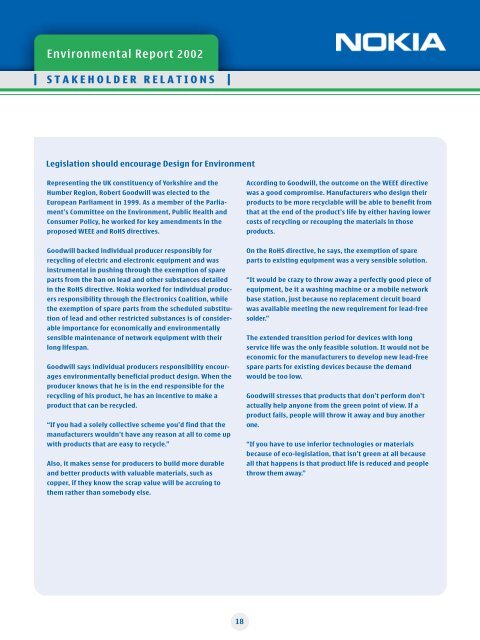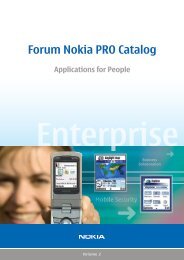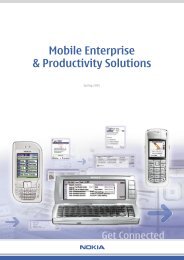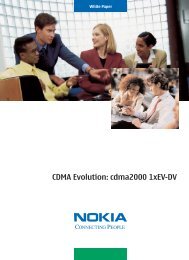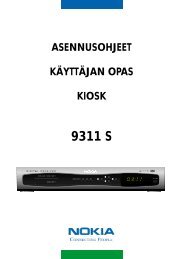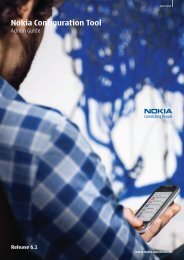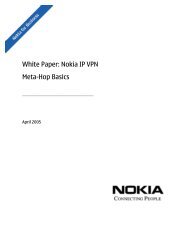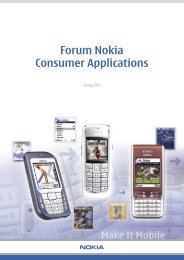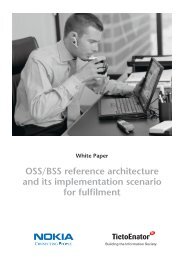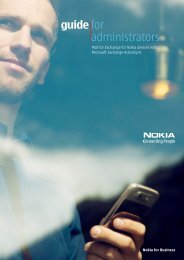Nokia Environmental Report 2002
Nokia Environmental Report 2002
Nokia Environmental Report 2002
Create successful ePaper yourself
Turn your PDF publications into a flip-book with our unique Google optimized e-Paper software.
<strong>Environmental</strong> <strong>Report</strong> <strong>2002</strong><br />
S T A K E H O L D E R R E L A T I O N S<br />
Legislation should encourage Design for Environment<br />
Representing the UK constituency of Yorkshire and the<br />
Humber Region, Robert Goodwill was elected to the<br />
European Parliament in 1999. As a member of the Parliament’s<br />
Committee on the Environment, Public Health and<br />
Consumer Policy, he worked for key amendments in the<br />
proposed WEEE and RoHS directives.<br />
Goodwill backed individual producer responsibly for<br />
recycling of electric and electronic equipment and was<br />
instrumental in pushing through the exemption of spare<br />
parts from the ban on lead and other substances detailed<br />
in the RoHS directive. <strong>Nokia</strong> worked for individual producers<br />
responsibility through the Electronics Coalition, while<br />
the exemption of spare parts from the scheduled substitution<br />
of lead and other restricted substances is of considerable<br />
importance for economically and environmentally<br />
sensible maintenance of network equipment with their<br />
long lifespan.<br />
Goodwill says individual producers responsibility encourages<br />
environmentally beneficial product design. When the<br />
producer knows that he is in the end responsible for the<br />
recycling of his product, he has an incentive to make a<br />
product that can be recycled.<br />
“If you had a solely collective scheme you’d find that the<br />
manufacturers wouldn’t have any reason at all to come up<br />
with products that are easy to recycle.”<br />
Also, it makes sense for producers to build more durable<br />
and better products with valuable materials, such as<br />
copper, if they know the scrap value will be accruing to<br />
them rather than somebody else.<br />
18<br />
According to Goodwill, the outcome on the WEEE directive<br />
was a good compromise. Manufacturers who design their<br />
products to be more recyclable will be able to benefit from<br />
that at the end of the product’s life by either having lower<br />
costs of recycling or recouping the materials in those<br />
products.<br />
On the RoHS directive, he says, the exemption of spare<br />
parts to existing equipment was a very sensible solution.<br />
“It would be crazy to throw away a perfectly good piece of<br />
equipment, be it a washing machine or a mobile network<br />
base station, just because no replacement circuit board<br />
was available meeting the new requirement for lead-free<br />
solder.”<br />
The extended transition period for devices with long<br />
service life was the only feasible solution. It would not be<br />
economic for the manufacturers to develop new lead-free<br />
spare parts for existing devices because the demand<br />
would be too low.<br />
Goodwill stresses that products that don’t perform don’t<br />
actually help anyone from the green point of view. If a<br />
product fails, people will throw it away and buy another<br />
one.<br />
“If you have to use inferior technologies or materials<br />
because of eco-legislation, that isn’t green at all because<br />
all that happens is that product life is reduced and people<br />
throw them away.”


